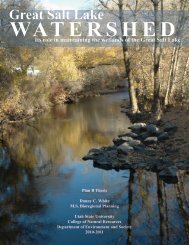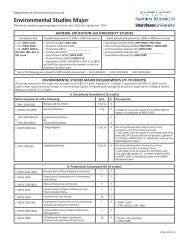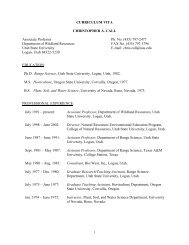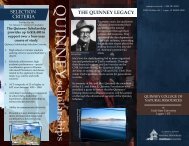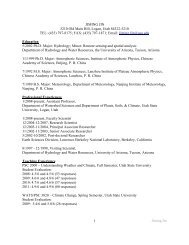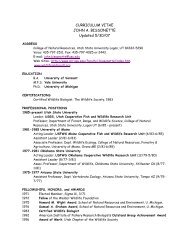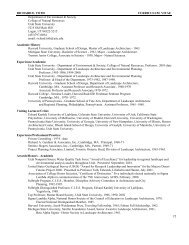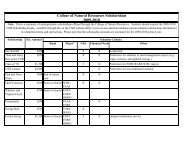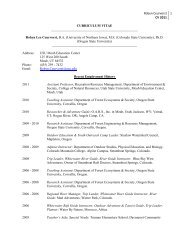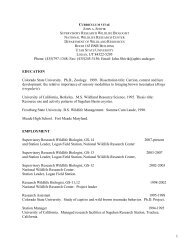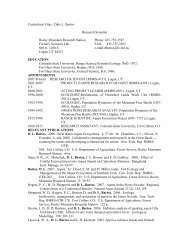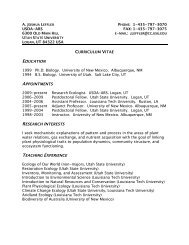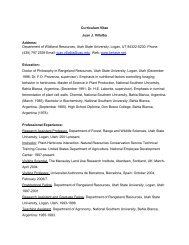University Education in Natural Resources - CNR Home - Utah State ...
University Education in Natural Resources - CNR Home - Utah State ...
University Education in Natural Resources - CNR Home - Utah State ...
You also want an ePaper? Increase the reach of your titles
YUMPU automatically turns print PDFs into web optimized ePapers that Google loves.
1998<br />
<strong>University</strong> <strong>Education</strong> <strong>in</strong> <strong>Natural</strong> <strong>Resources</strong> 39<br />
What k<strong>in</strong>d of education will natural resource professionals<br />
need to be able to work effectively <strong>in</strong> a world undergo<strong>in</strong>g a<br />
transition <strong>in</strong> core values, a transition where<strong>in</strong> the value problems<br />
of natural resources management are becom<strong>in</strong>g more and<br />
more closely related to the value problems of just relationships<br />
between persons, societies, and the land, even while recogniz<strong>in</strong>g<br />
that what is said is important, but what is done truly<br />
tells the story. A brief report on the SAF study as completed<br />
to date reveals some <strong>in</strong>terest<strong>in</strong>g th<strong>in</strong>gs regard<strong>in</strong>g forestry core<br />
values.<br />
The SAF Study of “Core Values”<br />
The major effort of the SAF Ethics Committee to gather data<br />
of SAF core values was at the 1997 Critical Issues Forum (IF).<br />
The CIF did not employ a high-powered research design, thus<br />
it has limitations. It was, for example, a self-selected sample<br />
of SAF members <strong>in</strong> three ways: first, those who came to the<br />
convention; second, those at the convention who chose to attend<br />
the CIF; and, third, <strong>in</strong> the case of what is reported here,<br />
those who chose to turn <strong>in</strong> an <strong>in</strong>dividual response form to a<br />
set of questions. Still, there were approximately 370 members<br />
<strong>in</strong>volved <strong>in</strong> the roundtable discussions, and 276 of them<br />
handed <strong>in</strong> the personal form. The follow<strong>in</strong>g set of results<br />
covers the first two questions of the <strong>in</strong>dividual response form 1 .<br />
Question 1. What attracted you to the profession?<br />
Responses fell <strong>in</strong>to three general categories:<br />
1. The land: 66 respondents said it was their love of the land/<br />
forest/nature/environment that attracted them to forestry; 16<br />
focused on their love of trees; and 35 used words such as “enjoy”,<br />
“<strong>in</strong>terest” and “appreciate” to describe their attraction to<br />
forestry. The s<strong>in</strong>gle biggest response was the 96 who said that<br />
they wanted to work either <strong>in</strong> the forest, on the land, <strong>in</strong> nature<br />
or the environment. These closely related responses make it<br />
fair to say that over 200 respondents specifically noted their<br />
love of and desire to work <strong>in</strong> the forest as someth<strong>in</strong>g that attracted<br />
them to forestry.<br />
2. The forestry profession: 42 respondents noted that it was<br />
the chance to manage/ conserve/protect/take action on forests<br />
that attracted them to forestry, while 19 noted the diversity,<br />
multidiscipl<strong>in</strong>ary nature and the opportunity to provide multiple-uses<br />
<strong>in</strong>herent <strong>in</strong> forestry that gave it appeal. Twenty-two<br />
were attracted by the notion of work<strong>in</strong>g with renewable/susta<strong>in</strong>able<br />
resources. A variety of other items were noted, but<br />
significantly less frequently (e.g., uniqueness, service, aesthetics,<br />
God’s creation, wildlife, etc.).<br />
3. Personal history: In part, this category refers to “who” or<br />
“what” got the <strong>in</strong>dividuals <strong>in</strong>terested <strong>in</strong> forestry. Twenty-n<strong>in</strong>e<br />
named family, and another 24 named organizations (Scouts,<br />
FFA, 4H, etc.). Other than where family was <strong>in</strong>volved (e.g., a<br />
“USFS brat”), only 7 noted that a forester had gotten them<br />
<strong>in</strong>terested <strong>in</strong> forestry. Sixteen noted their rural upbr<strong>in</strong>g<strong>in</strong>g,<br />
<strong>in</strong>clud<strong>in</strong>g farm and ranch, while 6 said they were attracted to<br />
forestry as a way to get off the farm or ranch (and 2 more “to<br />
get out of the city”). Twenty mentioned hunt<strong>in</strong>g, fish<strong>in</strong>g, camp<strong>in</strong>g<br />
or hik<strong>in</strong>g.<br />
Question 2. What basic values do you th<strong>in</strong>k foresters share?<br />
Like the responses to Question 1, and obviously closely<br />
related to them, the responses to Question 2 fell <strong>in</strong>to three<br />
general categories:<br />
1. The land: The s<strong>in</strong>gle largest response (83) had to do with<br />
love of the land/forest/environment/ nature. Thirty-five listed<br />
respect for the land, and 19 talked of care or concern for the<br />
land. Respondents also believed that foresters share a land<br />
ethic (34), a conservation/wise use ethic (19), or a stewardship<br />
ethic (40) as expressions of this love of the land.<br />
2. The forestry profession: The ethics above call for action,<br />
and based on this category of responses it seems fair to say the<br />
respondents see foresters as shar<strong>in</strong>g a belief that they are active<br />
land managers (71) who seek to susta<strong>in</strong>/renew forested<br />
ecosystems and resources (57) <strong>in</strong> service to society (34) so<br />
that the resources can be utilized by humans (50). Foresters<br />
are seen do<strong>in</strong>g this by tak<strong>in</strong>g a long-term view (38), and by<br />
bas<strong>in</strong>g their actions on sound science (39). Fifteen specifically<br />
noted their belief that foresters share the view that wood<br />
production is a valid use of forests, while 19 suggested that<br />
foresters believe that they are the ones who know best how to<br />
manage forests.<br />
3. Ethical pr<strong>in</strong>ciples: Some respondents took a different approach<br />
to “basic values,” list<strong>in</strong>g a range of ethical pr<strong>in</strong>ciples<br />
they believe to be shared by foresters. Not<strong>in</strong>g only those pr<strong>in</strong>ciples<br />
that received 5 or more responses, 31 respondents listed<br />
honesty, 14 <strong>in</strong>tegrity, 8 each for loyalty and responsibility, and<br />
7 noted trust. Another 17 suggested that foresters shared a<br />
strong work ethic.<br />
Discussion:<br />
The fact that such ethical pr<strong>in</strong>ciples as <strong>in</strong>tegrity, honesty, justice,<br />
altruism, and freedom were mentioned only <strong>in</strong> modest<br />
numbers by SAF respondents may be taken as <strong>in</strong>dicat<strong>in</strong>g that<br />
these are expected, givens. They transcend <strong>in</strong>dividuals and<br />
professions and form the foundation of right relationships<br />
among peoples. They form the basis for the largely anthropocentric<br />
codes of ethics of most natural resource professions. It<br />
becomes a case of br<strong>in</strong>g<strong>in</strong>g them to the attention of our students,<br />
giv<strong>in</strong>g students practice <strong>in</strong> wrestl<strong>in</strong>g with the gray areas<br />
of value debates, and serv<strong>in</strong>g as role models <strong>in</strong> our conduct.<br />
The results of the SAF study confirm the idea that foresters<br />
are attracted to forestry by a love of the forest and a strong<br />
desire to work <strong>in</strong> it. As much as they love the beauty, the<br />
work<strong>in</strong>gs, and the wonder of forests, they also recognize that<br />
forests are capable of produc<strong>in</strong>g a variety of goods and services,<br />
and they are will<strong>in</strong>g to accept the challenge of manag-




